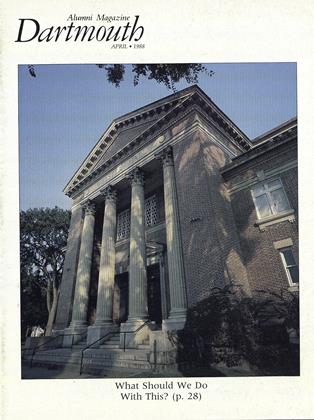In Central America it's often good news/bad news—and Panama's no exception. Politically the country has been going through a difficult period, to say the least. But environmentally, things are looking up and Juan Carlos Navarro '83 is right in the thick of this effort. He's the executive director of ANCON, the Panamanian national conservation association, which works closely with The Nature Conservancy.
Their overriding task is to protect renewable natural resources from public and private exploitation. Some 60 percent of the country's forest cover has already been destroyed, threatening both the Panama Canal watershed and hydroelectric power generation. Juan Carlos has been able to find some support, at home and abroad, although there's a long way to go. "Regardless of who's in power, our country cannot afford the irreversible loss of our natural heritage. And that," he says, "is what ANCON is all about."
And what is Juan Carlos Navarro, a Panamanian with an Ivy League degree, all about?
At Dartmouth he knew he wanted to learn more about his native landand became a geography major. Eventually, as a senior fellow, he was a research assistant to Prof. Vincent Malmstrom of the geography department on projects in both South America and Polynesia. Prof. Malmstrom reports that during their time on Easter Island they discovered that as early as the fourth century A.D. the islanders had used topographical landmarks as calendrical markers to indicate the solstices—much as their contemporaries in Mexico were doing.
Juan Carlos subsequently earned a master's in public administration at the John F. Kennedy School of Government in Boston (the same year his brother Eduardo graduated from Tuck). And he published, in both Spanish and English, the first geography of Panama. Juan Carlos enjoys an interesting combination of disciplines; they should stand him in good stead in both the bureaucratic jungle and the real one he wants to save.
 View Full Issue
View Full Issue
More From This Issue
-
 Feature
FeatureMaking Ambitious Ends Meet
April 1988 By Deborah Solomon -
 Feature
FeatureFather Bill's Answers
April 1988 By Benjamin Hart ’81 -
 Cover Story
Cover StoryWhat Should We Do With Webster Hall?
April 1988 -
 Article
ArticleThree Review Students Are Suspended After Confronting a Black Professor
April 1988 -
 Lettter from the Editor
Lettter from the Editorthe magazine has received a great many calls from alumni asking for an interpretation of the Cole affair.
April 1988 -
 Article
ArticleThree Minutes and One Second
April 1988







